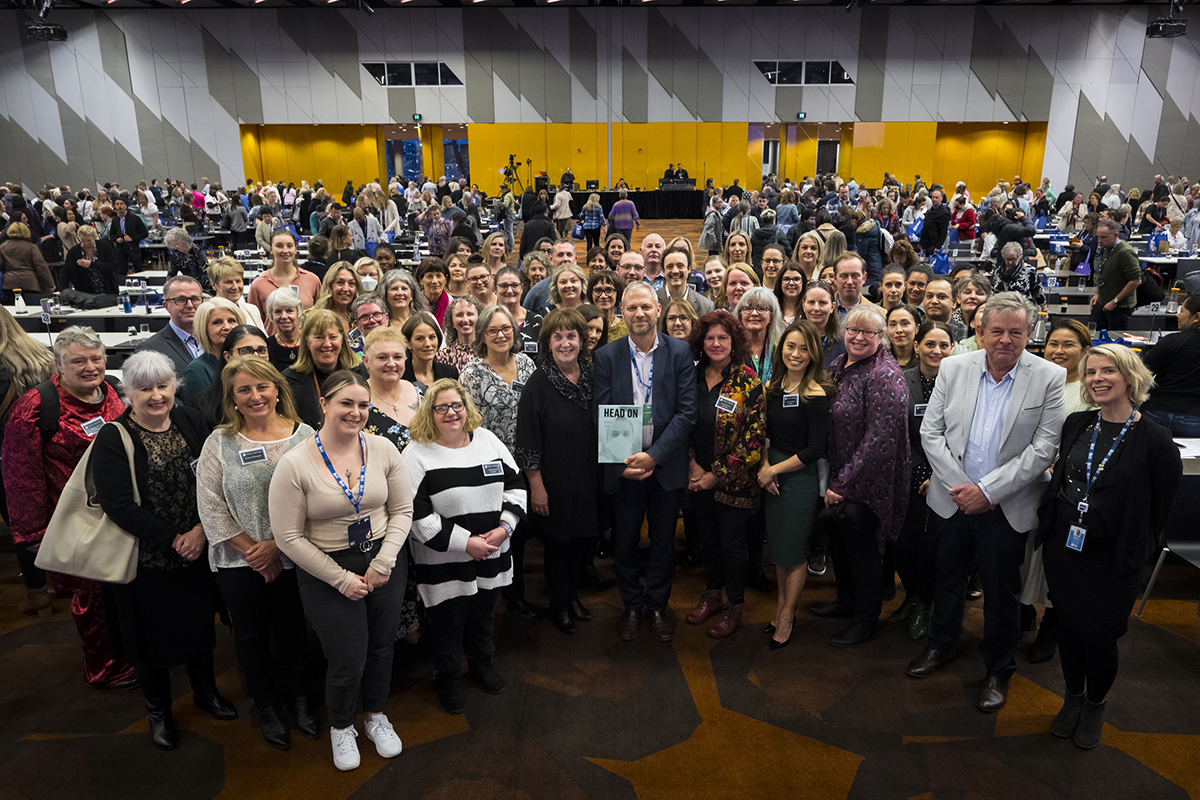
On Tuesday 6 December, there were 720 COVID positive patients in Victorian hospitals and 1535 healthcare workers, mostly nurses and midwives, furloughed. Weekly COVID data is available.
In response to staff restraints and rising hospitalisations, the Department of Health has moved public healthcare services to stage 3 under the COVID response plan. Stage 3 triggers public health services’ ability to implement extended team-based models (more information below), COVID streaming models and elective surgery reductions – to ensure the system can provide prioritise the most urgent care and provide the safest patient care possible.
Under stage 3 health services can make local decisions about managing non-urgent patients in emergency departments, non-urgent elective surgery and ultilising private hospital support to maintain planned care. Health services must:
- consider the number of COVID patients
- consider the impact of staff furlough and personal leave (none to low, moderate, severe or critical) on rosters
- undertake a qualitative and quantitative risk assessment using Department of Health data including demand on admitted, emergency and ambulance services.
View the ‘Health System Response Factsheet – 2 December‘ [PDF], which includes which includes the matrix to determine the level of stress on the health system.
ANMF (Vic Branch) Secretary Lisa Fitzpatrick continues to attend the regular health union meetings with the Department of Health representing our nursing and midwifery members and voicing your concerns.
COVID-19 stressed? You’re only human
Almost three pandemic years are having a cumulative impact on the nursing and midwifery workforce and we encourage members to check in with each other. If you are not coping or want to protect yourself from burnout, think about contacting the Nursing and Midwifery Health Program Victoria.
NMHPV is not a replacement for employers exhausting all avenues to ensure rosters are filled. But it is an important free and confidential service to help you maintain your wellbeing, develop healthy stress responses and find support if needed. NMHPV is run by nurses and midwives and provides support, counselling and referral. No concern is too big or too small. Phone 9415 7551 (business hours) or email admin@nmhp.org.au
Summer annual leave
While health services may consider cancelling staff leave under a stage 3 response, ANMF has requested that employers not cancel any approved annual leave. It is critical that nurses and midwives continue to access annual leave to be able to rest and recharge. However, should it occur, members in this position can contact ANMF Member Assistance for advice. The ANMF is asking that the change of roster allowance be paid to any nurses or midwives who agree to delay their approved annual leave.
Extended team models are an emergency response only
Moving public hospitals to stage 3 includes implementation of extended team-based models, in consultation with the ANMF and its members, only when ratios cannot be met on the forward roster with registered and enrolled nurses and midwives.
This model, including the reliance on redeployment, places additional pressure on experienced nurses and midwives which is why it must only be used as an emergency response. If implemented, the model must be continually reviewed and removed as soon as workforce constraints allow.
ANMF is aware a limited number of mostly metropolitan wards have implemented an extended team model under the new stage 3. Some maternity services were already using extended team models due to workforce pressures. ANMF is seeking urgent information from healthcare services, the Department of Health and our members. Job Reps are encouraged to contact their organiser via records@anmfvic.asn.au if extended team models are being proposed in your ward or unit.
Extended team-based models can be implemented in areas including medical, surgical, sub-acute, rehabilitation, haematology, oncology, neurology, cardiac, short stay and mental health.
Extended team-based models can be implemented in postnatal. Birthing suites must continue to staff midwives.
The extended team-based model includes RUSONs (Registered Undergraduate Students of Nursing) and RUSOMs (Registered Undergraduate Students of Midwifery) as part of the direct care team. RUSONs and RUSOMs, above ratios, have become a valuable part of the workforce and an essential part of our pandemic emergency response. As part of the extended team model, RUSONs and RUSOMs must only undertake the activities in their position description.
Before implementing an extended team model, a health service:
- must make best efforts to roster to ratios and meet the requirements of the Safe Patient Care Act 2015
- must continue to develop rosters based on the applicable ratios
- must exhaust all usual methods to fill a shift that is vacant due to unplanned leave including using the supplementary roster, exploring bank, pool and agency nurses, offer reasonable overtime to registered and enrolled nurses
- if the health service is unable to fill the shift, a RUSON or RUSOM can be included in the ratio
- Consult with the ANMF.
Other strategies include increasing telehealth and utilising existing funded modular emergency department units, additional APOT/HASM crews, rapid offload, telehealth and referring low acuity patients to alternative non-emergency services.
Claim all overtime and change of shift and meal allowances
A reminder to members to claim all overtime and change of roster and meal allowances you are entitled to.
Public sector members should refer to previously issued newsflashes and claim all their entitlements:
- Overtime [PDF]
- Change of shift [PDF]
- Meal allowance [PDF]
All other members should check their EBA entitlements via their Member Portal page or seek advice from Member Assistance by submitting an online inquiry.
Public sector meal and refreshment program
The Andrews Government meal and refreshment program [PDF] introduced in July continues until 31 December. ANMF is seeking a commitment from the government to continue funding this important support program. Staff working overtime or double shifts should be prioritised.
Special pandemic leave
The Victorian Department of Health’s Coronavirus Guidance Note on Employment-Related Matters [PDF] – provides advice on leave, including special paid leave if you are COVID positive and up to four-hours vaccination leave to receive the vaccination (including two days if you are unwell after your fourth dose). The guidance encourages employers to consider extending vaccination leave to casual employees. ANMF encourages all employers to follow this guidance, however, recognise that enforcement is limited to public sector employers only.
Has your respirator been fit tested?
ANMF continues to remind members the importance of regular fit testing for the correct respirator. Job Reps and HSRs should download this A4 fit testing infographic poster [PDF] to print and display on your workplace safety noticeboard.
Book your fourth dose if eligible
A fourth COVID vaccine is recommended for adults aged over 50 years. It is optional for those aged 30 to 49 years.
It is recommended to wait three months between your third and fourth dose or after having COVID-19, if infection has occurred since your third dose.
Free COVID vaccines are available at pharmacies and GPs.
Vaccination eligibility information
Fourth dose booking information
Antiviral and early treatment medicines
People at risk of severe illness and hospitalisation are eligible for early treatment medicines to help them stay well. Eligibility includes people aged over 70, people aged over 50 with certain health conditions and Aboriginal and Torres Strait Islander people aged over 30 years.
These medicines must be taken within five days of becoming sick. They are not a replacement for vaccination.
Members are encouraged to share information about eligibility and access to antiviral and early treatment medicines. The ANMF awaits the outcome of the antiviral healthcare worker pilot.
Respiratory clinics and virtual ED – spread the word
Free respiratory clinics remain open across Victoria. Please share with your friends and family.
Victoria has more than 50 respiratory clinics, including paediatric clinics, established to ease the pressure on our emergency departments and GP clinics. These clinics are funded by the Federal and Victorian Governments. ANMF understands federal funding ends on 31 December. We are seeking more information about funding and the future of these clinics which can prevent unnecessary respiratory admissions to hospitals and provide an important primary care service for the public.
Additionally, please let friends and family know they can access the free Victorian Virtual ED for on-life-threatening emergency care.
COVID testing – RATs and PCR
A rapid antigen test (RAT) is recommended if you have symptoms or have been in contact with someone who has COVID-19. Some testing sites provide RAT kits and free N95 masks – these locations are listed on the Victorian Government’s coronavirus website. Previously you could collect free RAT kits for each person listed on your Medicare card. This is now extended to each person living in your household.
Report your positive RAT to ensure you have access to the COVID positive pathways program and care.
Need ANMF advice or support?
Members can complete an online Member Assistance inquiry form (scroll to the bottom of the page for the button).
Got a colleague not receiving ANMF emails?
Let them know they can re-subscribe.


